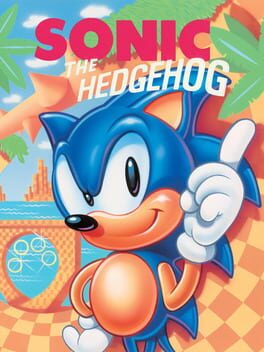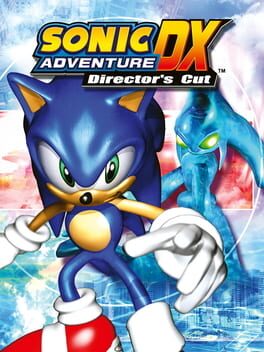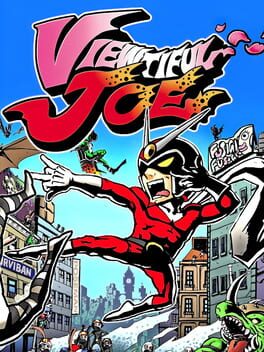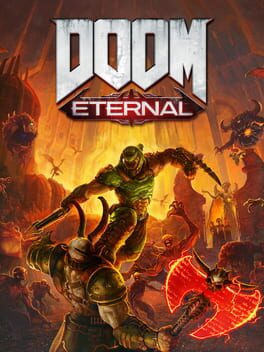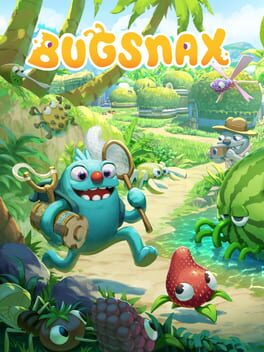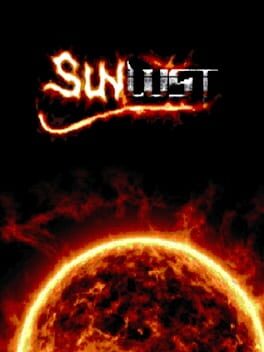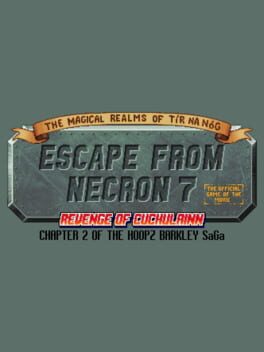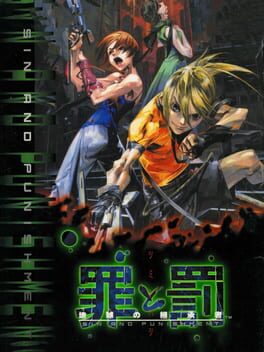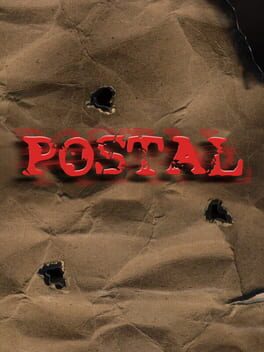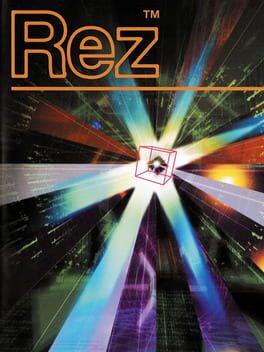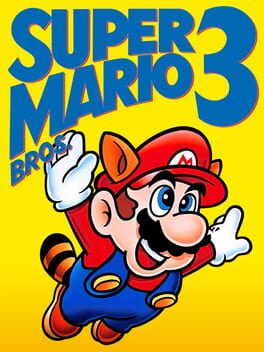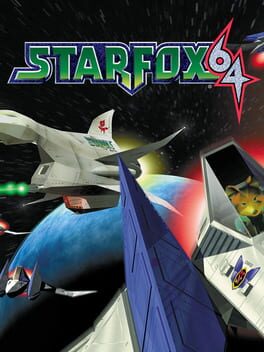SlapOnToast
1151 Reviews liked by SlapOnToast
Super Mario 64
1996
Sonic the Hedgehog
1991
this game's awesome. You think it's about always going fast.. but you gotta go slow first.... and then learn HOW to go fast.. Movement has a real weight to it; it's not like Sonic can stop on a dime like in something like super mario. This creates a fun dynamic that encourages you to test the limits of what you can get away with and push for going even faster each time. This especially comes into play when the relative flat safety of green hill zone transitions into the deadly platforming of the later stages. Heck yeah.
Viewtiful Joe
2003
Doom Eternal
2020
i haven't actually played in a while and even then i didn't play much—really because i just wasn't feeling its new ammo and weapon switching system. i don't want to worry so much about all that when i'm playing doom and i'd even say it's such a departure that perhaps it should've been the basis of something entirely new. after having seen some videos of high difficulty play and the way it encourages a rhythm of avoidance and then diving in for kills and refills... well, that sounds like fun, and maybe it would be if i simply committed myself to the more hectic feel of it, but i really felt like the flow of the 2016 game was more satisfying—less stressful.
another thing: the amped up goofiness is fourth wall breaking and video game-y in a way i find really offputting. this may seem to be neither here nor there, but i want to compare this to machinegames' wolfenstein: the old blood, where a silly moment is cleverly crafted to inspire dramatic tension while also making you laugh. instead of describing it, a link: https://www.youtube.com/watch?v=QU6tQY3eMLM
(literally posting this review because i was chatting with friends in irc about how i chose to pick up some polish sausages for dinner, and that every time i have a hot dog now i remember that line: "ja... ein 'hot dog'." it brings a smile to my face.)
all of this is to say that while doom 2016 was a fine game and i appreciated the decision to go for a fairly minimalistic narrative, i think that especially after eternal i can say the wolfenstein revival has been far more successful. in fact, it dismays me to see how those games seem to have been so thoroughly cast aside among backloggd regulars in particular. in terms of taking an oldschool fps with a supporting narrative even more basic than the original doom's, i feel they're wildly successful at extrapolating a world and a story populated by fully rendered and emotional human characters—even when it also goes for the absurd, over-the-top HUGENESS of its action, its horror... and its heart. doom eternal, meanwhile, lets you collect funko pops.
another thing: the amped up goofiness is fourth wall breaking and video game-y in a way i find really offputting. this may seem to be neither here nor there, but i want to compare this to machinegames' wolfenstein: the old blood, where a silly moment is cleverly crafted to inspire dramatic tension while also making you laugh. instead of describing it, a link: https://www.youtube.com/watch?v=QU6tQY3eMLM
(literally posting this review because i was chatting with friends in irc about how i chose to pick up some polish sausages for dinner, and that every time i have a hot dog now i remember that line: "ja... ein 'hot dog'." it brings a smile to my face.)
all of this is to say that while doom 2016 was a fine game and i appreciated the decision to go for a fairly minimalistic narrative, i think that especially after eternal i can say the wolfenstein revival has been far more successful. in fact, it dismays me to see how those games seem to have been so thoroughly cast aside among backloggd regulars in particular. in terms of taking an oldschool fps with a supporting narrative even more basic than the original doom's, i feel they're wildly successful at extrapolating a world and a story populated by fully rendered and emotional human characters—even when it also goes for the absurd, over-the-top HUGENESS of its action, its horror... and its heart. doom eternal, meanwhile, lets you collect funko pops.
Bugsnax
2020
Sunlust
2015
A lonely, challenging experience. Of course most DOOM WADs don't have any other characters in them, very rarely deciding to sprinkle in marine corpses to signify someone was here, but Sunlust is such an oppressive experience that the lack of humanity of it all feels emotionally attuned to the level progression. Any notion of humanity left in Sunlust's world is actively malignant-- MAP29 for example, "Go Fuck Yourself", is uniquely human to the player in design, architecture, and title. The Archvile Carousel is too purposeless, too vexatious to be designed by any thing but a human. Yet, like with most challenge maps, it's made to be bested, but only by those willing to buy in and mortify themselves to gitting gud.
In fact, this idea of mortification, of purity through rigid self-discipline, is an idea that permeates not just in Sunlust but in the discourse of 'difficulty' in video games as a whole. For every new completion of Sunlust, there's a DOOMer out there who will remind you that you haven't really 'completed' Sunlust until you've done it with no savescumming, and there's a DOOMer above them that will remind you that only pistol start UV counts as completion, and so on and so on. Anyone who had the unfortunate luck to witness Souls "summoning discourse" can also attest to similar convos. It's eerily similar to where this mortification discourse actually comes from--Medieval Christianity. You aren't really free of sin until you've abstained from something important, until you've fasted, until you've lived ascetically, until you've self-flagellated, etc.
And while the merits and foibles of mortification are too big for this review, the takeaway shouldn't be to do away with the ideas of purity or self-discipline, but to take a more personal, existential approach to them. Play Sunlust, but don't feel the need to surrender to it's weight of difficulty or of being one of the GOAT WADs or anything else. noclip to admire the architecture, throw on godmode, try a UV run, make a save for the Cathedral fight to replay forever, do whatever--just make it challenging and purifying to you, and see where you land. ribbiks has said he views DOOM more as a canvas than a video game, and there's no reason you shouldn't too.
In fact, this idea of mortification, of purity through rigid self-discipline, is an idea that permeates not just in Sunlust but in the discourse of 'difficulty' in video games as a whole. For every new completion of Sunlust, there's a DOOMer out there who will remind you that you haven't really 'completed' Sunlust until you've done it with no savescumming, and there's a DOOMer above them that will remind you that only pistol start UV counts as completion, and so on and so on. Anyone who had the unfortunate luck to witness Souls "summoning discourse" can also attest to similar convos. It's eerily similar to where this mortification discourse actually comes from--Medieval Christianity. You aren't really free of sin until you've abstained from something important, until you've fasted, until you've lived ascetically, until you've self-flagellated, etc.
And while the merits and foibles of mortification are too big for this review, the takeaway shouldn't be to do away with the ideas of purity or self-discipline, but to take a more personal, existential approach to them. Play Sunlust, but don't feel the need to surrender to it's weight of difficulty or of being one of the GOAT WADs or anything else. noclip to admire the architecture, throw on godmode, try a UV run, make a save for the Cathedral fight to replay forever, do whatever--just make it challenging and purifying to you, and see where you land. ribbiks has said he views DOOM more as a canvas than a video game, and there's no reason you shouldn't too.
Pretty good for a vaporware!
It still has some funny moments with it, despite the grittiness. The gun breeding system was interesting to experiment with, and I loved the DwarfNET. There was a lot of passion put into the project, too bad ot ended up this way.
You know, it's interesting how the first game was a rather straightforward jrpg game and this one was supposed to be this overly ambitious dark and gritty eurojank-like wrpg with obvious Gothic inspirations. Makes me wonder if that contrast was supposed to be a joke. If it was, then I guess it kinda backfired on them.
It still has some funny moments with it, despite the grittiness. The gun breeding system was interesting to experiment with, and I loved the DwarfNET. There was a lot of passion put into the project, too bad ot ended up this way.
You know, it's interesting how the first game was a rather straightforward jrpg game and this one was supposed to be this overly ambitious dark and gritty eurojank-like wrpg with obvious Gothic inspirations. Makes me wonder if that contrast was supposed to be a joke. If it was, then I guess it kinda backfired on them.
Sin and Punishment
2000
Shit owns. It's definitely in contention for THE best N64 game of all time.
The incredible set pieces Treasure managed to eke out of the 64's limited processing power are just stunning, from front to back. It doesn't control the best -- it always feels a bit clunky -- but it's almost like the game knows this, and so it passes out continues like candy, and offers super-generous checkpoints. It doesn't want to frustrate you, or grind you down with difficulty (though there's always 1CC attempts, hard mode, and playing for score if you WANT that); it just wants you to have a fuckin' rad time.
The incredible set pieces Treasure managed to eke out of the 64's limited processing power are just stunning, from front to back. It doesn't control the best -- it always feels a bit clunky -- but it's almost like the game knows this, and so it passes out continues like candy, and offers super-generous checkpoints. It doesn't want to frustrate you, or grind you down with difficulty (though there's always 1CC attempts, hard mode, and playing for score if you WANT that); it just wants you to have a fuckin' rad time.
Postal
1997
Transgressive art is art that is made to outrage in some way. It's in the name after all: the word "transgress" means to go over some kind of boundary, which in transgressive art, usually comes in the form of shock value utilized for the purpose to offend. In gaming culture, it seems there's a rush to justify the medium's nature as an art form by propping up more palatable and marketable titles that seek to have that arthouse flair or some form of cinematic sensibility, but if gaming is to mature as a medium, we must be able to acknowledge the ugly and the transgressive, and to do so, we can look no further than 1997's Postal.
I'll cut to the chase: this game isn't very good. The arcade-style gameplay is incredibly mediocre and drawn out way too long for its comparatively short runtime, and it really runs out of interesting gameplay ideas about a quarter of the way in. However, if I am being completely honest, the gameplay of Postal is the least interesting thing about it. The most interesting part of Postal lies in everything else surrounding said gameplay.
Despite the series' reputation nowadays, the original Postal does not look nor play the way you think it would. Your goal is to defeat a certain percentage of hostiles on each map, and while civilians can roam the map and flee in terror and get mowed down en masse, the game neither explicitly rewards or condemns you for doing so. There's the occasional morbid joke from an NPC, or a glib one-liner from the Postal Dude's inner monologue, but the "mass shooter" angle is played mostly straight. The atmosphere is top-notch as your rampage is backed by both the diegetic background noise and the occasional piece of droning, industrial ambience designed to unnerve you and really put you into the headspace of madness. Playing on Hard mode opens each stage with a diary entry from the Postal Dude, detailing his descent into madness and his penchant for violence as he believes himself to be on a one-man crusade against a supposed chemical attack from the military that is turning the townsfolk insane. The final mission is a cutscene of the Postal Dude attempting to shoot up a school (predating the Columbine Shooting by 2 years!) but finding his weaponry utterly ineffective at harming children, before he passes out and is finally locked inside a mental institution as a narrator reads off the definition of "going postal," ascribing his violent rampage to the mundanities of everyday life.
While the series' change in tone with expansion packs & future installments, and the direct quotes from Running With Scissors' founder Vince Desi claiming that the game was meant to be "really fun and fast, action-paced" would give the idea that the game's tone is intended to be humorous, the way Postal frames its violence is very purposeful and is not as fun or humorous as they may have intended it to be. One of the most common themes explored in transgressive art is that of mental illness and psychological dissociation, and taking into consideration both Postal's premise and conclusion, there's certainly more thought put into its themes and message beyond being a careless murder spree. Postal posits its violence as a product of contemporary society in a very unflattering, raw light that suggests a grander ambition than the comedic action game angle they claimed it to be (and would eventually fully realize with Postal 2). While Postal 2 went off the deep end of parody and was firing on all cylinders to be as offensive as possible on all angles, the more subdued, classical transgressive nature of Postal actually felt like it had something more meaningful to say, even if it wasn't entirely on purpose. Postal's controversy held up a mirror to the nature of mindless violence in society; the raw, brutal nature of it removing any glitz or glamor that the media would normally use to paint such violence with so as to be "entertainment." It's an experiment born of spite who's creation and ensuing controversy could only come from the minds of disgruntled former edutainment developers who wanted to make a real impact and push the boundaries of acceptability in the gaming landscape. Postal is an ugly, transgressive game that kind of needed to be made for gaming as a whole to mature as an art form.
I'll cut to the chase: this game isn't very good. The arcade-style gameplay is incredibly mediocre and drawn out way too long for its comparatively short runtime, and it really runs out of interesting gameplay ideas about a quarter of the way in. However, if I am being completely honest, the gameplay of Postal is the least interesting thing about it. The most interesting part of Postal lies in everything else surrounding said gameplay.
Despite the series' reputation nowadays, the original Postal does not look nor play the way you think it would. Your goal is to defeat a certain percentage of hostiles on each map, and while civilians can roam the map and flee in terror and get mowed down en masse, the game neither explicitly rewards or condemns you for doing so. There's the occasional morbid joke from an NPC, or a glib one-liner from the Postal Dude's inner monologue, but the "mass shooter" angle is played mostly straight. The atmosphere is top-notch as your rampage is backed by both the diegetic background noise and the occasional piece of droning, industrial ambience designed to unnerve you and really put you into the headspace of madness. Playing on Hard mode opens each stage with a diary entry from the Postal Dude, detailing his descent into madness and his penchant for violence as he believes himself to be on a one-man crusade against a supposed chemical attack from the military that is turning the townsfolk insane. The final mission is a cutscene of the Postal Dude attempting to shoot up a school (predating the Columbine Shooting by 2 years!) but finding his weaponry utterly ineffective at harming children, before he passes out and is finally locked inside a mental institution as a narrator reads off the definition of "going postal," ascribing his violent rampage to the mundanities of everyday life.
While the series' change in tone with expansion packs & future installments, and the direct quotes from Running With Scissors' founder Vince Desi claiming that the game was meant to be "really fun and fast, action-paced" would give the idea that the game's tone is intended to be humorous, the way Postal frames its violence is very purposeful and is not as fun or humorous as they may have intended it to be. One of the most common themes explored in transgressive art is that of mental illness and psychological dissociation, and taking into consideration both Postal's premise and conclusion, there's certainly more thought put into its themes and message beyond being a careless murder spree. Postal posits its violence as a product of contemporary society in a very unflattering, raw light that suggests a grander ambition than the comedic action game angle they claimed it to be (and would eventually fully realize with Postal 2). While Postal 2 went off the deep end of parody and was firing on all cylinders to be as offensive as possible on all angles, the more subdued, classical transgressive nature of Postal actually felt like it had something more meaningful to say, even if it wasn't entirely on purpose. Postal's controversy held up a mirror to the nature of mindless violence in society; the raw, brutal nature of it removing any glitz or glamor that the media would normally use to paint such violence with so as to be "entertainment." It's an experiment born of spite who's creation and ensuing controversy could only come from the minds of disgruntled former edutainment developers who wanted to make a real impact and push the boundaries of acceptability in the gaming landscape. Postal is an ugly, transgressive game that kind of needed to be made for gaming as a whole to mature as an art form.
Chrono Trigger
1995
Rez
2001
Super Mario Bros. 3
1988
It's a solid entry in the series, but the big thing I see in this game is its variety compared to SMB1. There's a lot more enemies, a lot more levels, a lot more items, etc.
But variety doesn't automatically make a game better in my book, and I think what SMB3 does well in adding variety to the table, fails to execute most of the ideas in interesting ways. Some ideas are undercooked, for example, the kuribo boot, which is only used in one level, and even some of the enemy placement feels a bit cheep.
The level design feels all over the place in terms of difficulty. I found some of the levels to either be too easy (and short) or way too difficult or tedious. I especially found World 4 to be the 2nd easiest world in the game compared to 2 & 3, and World 7 was easier than World 6.
World 8, especially, has a massive difficulty spike that doesn't feel fair for first time players first experiencing the world. You could make the excuse that it's supposed to be hard 'cuz it's the last world in the game, but levels ask too much of the player, requiring them to deal with obstacles you never experienced early on, and the mid-fortress... my god. It has to be one of the most frustrating levels I've ever experienced in a 2D Mario game. It's maze-like, which doesn't work well with the fact that this game has a timer for each stage.
Despite mosty being really negative to this game, I don't want to write it off as a bad game. It's still fine for what it is and is definitely better than SMB2, but I personally fail to put this above SMW or even SMB1, which despite being a game with very less variety, still manages to be an exceptional platformer that works around the controls and has a proper difficulty curve, even if the game has a more arcade-like structure to it.
But variety doesn't automatically make a game better in my book, and I think what SMB3 does well in adding variety to the table, fails to execute most of the ideas in interesting ways. Some ideas are undercooked, for example, the kuribo boot, which is only used in one level, and even some of the enemy placement feels a bit cheep.
The level design feels all over the place in terms of difficulty. I found some of the levels to either be too easy (and short) or way too difficult or tedious. I especially found World 4 to be the 2nd easiest world in the game compared to 2 & 3, and World 7 was easier than World 6.
World 8, especially, has a massive difficulty spike that doesn't feel fair for first time players first experiencing the world. You could make the excuse that it's supposed to be hard 'cuz it's the last world in the game, but levels ask too much of the player, requiring them to deal with obstacles you never experienced early on, and the mid-fortress... my god. It has to be one of the most frustrating levels I've ever experienced in a 2D Mario game. It's maze-like, which doesn't work well with the fact that this game has a timer for each stage.
Despite mosty being really negative to this game, I don't want to write it off as a bad game. It's still fine for what it is and is definitely better than SMB2, but I personally fail to put this above SMW or even SMB1, which despite being a game with very less variety, still manages to be an exceptional platformer that works around the controls and has a proper difficulty curve, even if the game has a more arcade-like structure to it.

